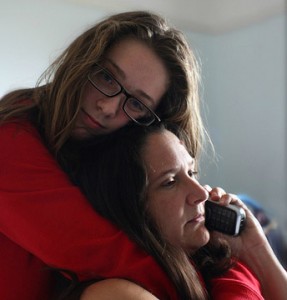 I’m heading over to Charlottesville’s Shelter for Help in Emergency this Friday night for my monthly volunteer shift, so the topic of domestic violence is on my mind. Plus, I wanted to share some thoughts on this issue before October ends. I’m sure I don’t have to tell you how important it is.
I’m heading over to Charlottesville’s Shelter for Help in Emergency this Friday night for my monthly volunteer shift, so the topic of domestic violence is on my mind. Plus, I wanted to share some thoughts on this issue before October ends. I’m sure I don’t have to tell you how important it is.
I did some web surfing about how churches and Christians often deal with domestic violence, so since I’m not the expert, I’m going to share with you some of the powerful words of writers who are. Links are included to each full article.
From Domestic Violence within the Church: The Ugly Truth:
“Spouse abuse shocks us,” [Denise] George writes. “We just cannot believe that a church deacon or member goes home after worship . . . and beats his wife.” Tragically, however, George notes, some of these men justify their violence “by citing biblical passages.”
George sites a survey in which nearly 6,000 pastors were asked how they would counsel women who came to them for help with domestic violence. Twenty-six percent would counsel them … to continue to “submit” to her husband, no matter what. Twenty-five percent told wives the abuse was their own fault—for failing to submit in the first place. Astonishingly, 50 percent said women should be willing to “tolerate some level of violence” because it is better than divorce. Advice like this, George warns, often puts women “in grave danger”—and in some cases, can be a death warrant.
From Confronting Domestic Violence with Love and Authority:
Most domestic violence victims don’t consider the church a relevant place to go for help, because when they tried asking for help in the past, the response they got was weak or passive at best….
Why is domestic violence such a threat to the Body of Christ? Because it’s an enemy we have given untold power to by keeping it hidden. We don’t talk about it with our teens. We don’t talk about it in premarital counseling. And we certainly don’t talk about it on Sunday mornings. National campaigns to end domestic violence tout the phrase “Break the Silence.” Yet the place where the silence often gets most strongly upheld is in church. Maybe we avoid the topic of domestic violence because if it’s happening within a marriage we consider it off-limits territory. Maybe we shy away because we are uneducated or haven’t had any personal experience dealing with it. Or maybe because confronting it makes us too uncomfortable and calls out of us a relational discernment and spiritual authority we’re not sure we have. Whatever the reason, our silence is costly.
From How Should The Church Deal With Domestic Violence:
Domestic violence perpetrators rarely take responsibility for their anger. The church should understand and be able to readily identify all forms of abuse: verbal, emotional, spiritual and physical. Sinful behavior thrives in ignorance and secrecy, but bringing the matter to light will help hold people accountable for their actions. Spiritual leaders must be careful not to fall for deceptive and manipulative of tactics of those that are trying to protect themselves. [Author Al] Miles warns Christians to not resist the notion that self-professed followers of Christ would use violence and abuse to control others.
From Abuse Survivor on Domestic Violence Awareness Month: Be Gentle and Support the 10 Million Victims:
Forty-two percent of pastors “rarely” or “never” speak about domestic violence, and less than a quarter speak to their church about it once a year, said the report of a telephone survey conducted by LifeWay Research among 1,000 senior pastors of Protestant churches.
LifeWay also found that among its sample of 1,000 senior pastors of Protestant churches that less than half of them were trained to help victims of domestic violence.
Another telling finding among pastors who don’t address domestic violence was their belief that such abuse is not a problem in their congregations.
From The Silent Epidemic:
Be careful not to criticize an abused woman, because until you’ve walked in her shoes, you can’t appreciate the unbelievable hell she lives in every day. It’s very difficult for a woman to walk away from an abusive situation—often the batterer is the full breadwinner in the family and she fears economic hardship. Nearly 50 percent of all homeless women and children in the U. S. are without a home because they’re fleeing from domestic violence. Also, a woman may fear greater harassment from her spouse if she leaves, and this could prevent her from getting the help she needs.
… Church members are so afraid of promoting divorce, they often don’t give women the help they need. Sometimes divorce is the end result of domestic violence…. That’s why it’s important leaders learn how to properly advise abused women. The techniques people use to counsel couples with other marital problems don’t work with domestic abuse.
*****
And from me again: Our prayers go up today on behalf of all those who have suffered or are suffering from emotional, physical or sexual abuse. We pray for your safety and protection, strength, hope, courage, restoration and a clear way forward. And we pray for God’s help to keep our eyes, ears and hearts open to be there with just the right response exactly when you need us.
photo credit: Canon EOS 60D – Becca & Lisa via photopin (license)

Leave a Reply
You must be logged in to post a comment.